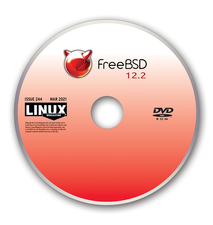On the DVD
On the DVD

FreeBSD 12.2 and GhostBSD
So you think you know open source? Just the fact that you are reading this page means that what you probably know is Linux. This month, the DVD provides a glimpse into another corner of open source – the world of BSD. Like Linux, BSD varieties are free operating systems that are Unix descendants. However, they are released under the permissive BSD licenses rather than the copyleft licenses that dominate Linux. You will also find many other differences, despite the similar underlying structures.
FreeBSD 12.2 (64-bit)
First released in 1992, FreeBSD is the most popular version of BSD, especially for servers. Those coming from Linux will find many details different, such as the device naming system, as well as many commands and applications. More importantly, FreeBSD has never passed through a popularity phase like the one that drove Linux to develop mature desktop environments – although some mature BSD environments are available today. Instead, FreeBSD more resembles Linux in its hobbyist days. For instance, FreeBSD's install is a text-based series of questions with no hardware auto-detection. Furthermore, no desktop environment is installed, although users can add one later.
FreeBSD's assumption is that users have the knowledge or interest to work with FreeBSD until their systems are configured to their liking. Installation is unlikely to produce a working desktop system in 15 minutes. Instead, users should be ready to refer repeatedly to the FreeBSD documentation (https://www.freebsd.org/docs.html) and to fetch desired applications from websites. The reward for this effort will be greater knowledge of Unix-like systems – as well as the satisfaction that comes with doing it yourself.
[...]
Buy this article as PDF
(incl. VAT)
Buy Linux Magazine
Subscribe to our Linux Newsletters
Find Linux and Open Source Jobs
Subscribe to our ADMIN Newsletters
Support Our Work
Linux Magazine content is made possible with support from readers like you. Please consider contributing when you’ve found an article to be beneficial.

News
-
The Next Linux Kernel Turns 7.0
Linus Torvalds has announced that after Linux kernel 6.19, we'll finally reach the 7.0 iteration stage.
-
Linux From Scratch Drops SysVinit Support
LFS will no longer support SysVinit.
-
LibreOffice 26.2 Now Available
With new features, improvements, and bug fixes, LibreOffice 26.2 delivers a modern, polished office suite without compromise.
-
Linux Kernel Project Releases Project Continuity Document
What happens to Linux when there's no Linus? It's a question many of us have asked over the years, and it seems it's also on the minds of the Linux kernel project.
-
Mecha Systems Introduces Linux Handheld
Mecha Systems has revealed its Mecha Comet, a new handheld computer powered by – you guessed it – Linux.
-
MX Linux 25.1 Features Dual Init System ISO
The latest release of MX Linux caters to lovers of two different init systems and even offers instructions on how to transition.
-
Photoshop on Linux?
A developer has patched Wine so that it'll run specific versions of Photoshop that depend on Adobe Creative Cloud.
-
Linux Mint 22.3 Now Available with New Tools
Linux Mint 22.3 has been released with a pair of new tools for system admins and some pretty cool new features.
-
New Linux Malware Targets Cloud-Based Linux Installations
VoidLink, a new Linux malware, should be of real concern because of its stealth and customization.
-
Say Goodbye to Middle-Mouse Paste
Both Gnome and Firefox have proposed getting rid of a long-time favorite Linux feature.
